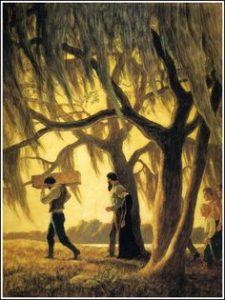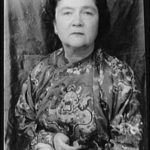As part of my presentation to the Marjorie Kinnan Rawlings Society in Mt. Dora, FL in 2018, I used quotes from the writers Marjorie Kinnan Rawlings and Zora Neale Hurston to illustrate their struggles and perceptions and to tell their stories as I perceive them. I’ll provide some context but this is mostly a record of some extensive research.
Zora writing about her personality clash with her father, Baptist preacher John Hurston:
“I did hear he threatened to cut his throat when he heard the news [of a second girl]…He was nice about it in a way. He didn’t tie me in a sack and drop me in a lake as he probably felt like doing.” Dust Tracks on a Road, Hurston’s autobiography
Marjorie writes about her own view of her mother:
“She longed for beauty in her mother; Ida’s awkwardness, lankness and homeliness as she worked herself sick at cooking and housekeeping repulsed her.” Blood of My Blood, a late-found manuscript detailing Marjorie’s youth.
Zora’s comment about Marjorie’s writing:
You see and feel the immense past, what is now and feel inside you what is to come. Therefore you are not pacing the cell of the current hour. You are free because you made your peace with the universe and its laws. Crossing the Creek, A Literary Friendship. Dr. Anna Lillios
A Comparison Between Zora’s description of her mother’s early death, and Richard Wright ‘s description of a stroke that left his mother immobilized and forced him to drop out of school. Wright was a 1940s writer who set a new aggressive tone against racial prejudice. Zora wrote about gender politics and refused to write about the racial divide:
An N.C. Wyeth illustration of a funeral in The Yearling
“That night I ceased to react to my mother; my feelings were frozen. I merely waited on her knowing she was suffering..It made me want to drive coldly to the heart of of every question and lay it open to the core of suffering I would find there” Richard Wright Black Boy 1945
“She depended on me for a voice…And then in sunset time, I failed her. Mama died at sundown and changed a world. That is the world which had been built out of her body and her heart…” Dust Tracks on a Road
Comparing Hurston’s description of finding a trashed copy of Milton’s Paradise Lost in the woods and using it to educate herself to Mary Shelley’s Frankenstein (an anti-slavery book) where the monster finds the three classic books in an old suitcase in the woods and uses Paradise Lost as a stepping stone to understand humans:
“Paradise Lost moved every feeling of wonder and awe that the picture of an omnipotent Bod warring with his creations was capable of exciting.” Frankenstein (1818)
In a pile of rubbish, I found a copy of Milton’s complete works…When I was supposed to be out looking for work I would be stretched out somewhere in the woods reading (Paradise Lost) slowly so that I could understand. Wrapped in Rainbows, Valerie Boyd, Dr. Henry Gates, NYTimes.com
These quotes were part of my presentation: Many thanks to the Rawlings Society for their annual meetings in some of the most interesting places in Old Florida.








Love your explorations!
What a contrast between Richard Wright’s perception of his mother’s death having changed “the world which had been built out of her body and her heart”, and Kinnan Rawling’s view of her mother’s “lankness and homeliness as she worked herself sick..”
Two sides of the coin, eh?